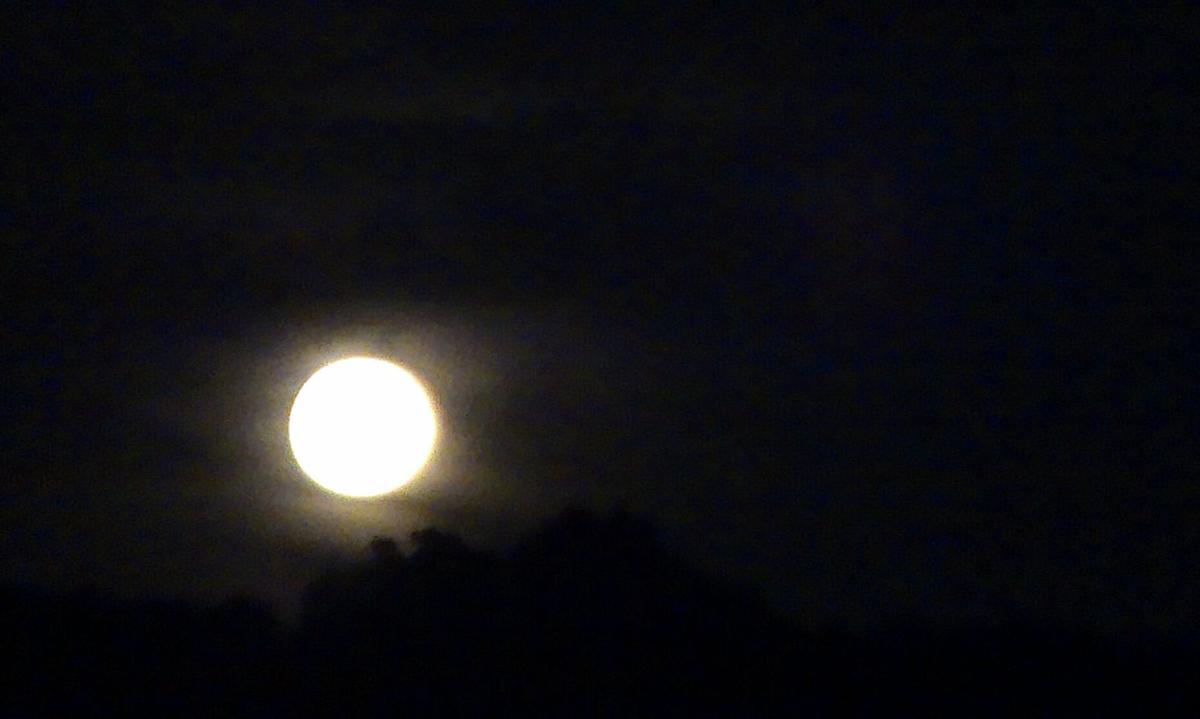
Mick Scott: Just like children sleeping

Harvest Moon, on Oct. 1, as seen from Reynolda House.
MICK SCOTT, Journal
That was me standing in the field in front of Reynolda House on Thursday night, with my second-hand telescope and a couple of friends (safety distanced), waiting for the full moon to rise. It came up in the east from behind the trees right on schedule, orange-yellow, creamy and totally entrancing, for maybe half an hour before moving behind the gathering clouds.
I wasn’t much aware of the moon and the stars as a kid — I liked watching TV instead. I grew up in a middle-class neighborhood — well, upper-middle-class, maybe — middle-upper-middle — we did all right — in Burlington in the 1960s and ’70s, in a modern housing development on a street with other children my age. We had a fenced-in backyard and a brown mutt named Cocoa. We never wanted for anything material, my sister and me. We never worried about what we would eat or where we would sleep. When we had medical needs, “Insurance will cover it,” Dad said.
I was enamored of hippies as a kid — the TV kind, with long hair and colorful clothes who said, “Groovy, man.” I had an electric guitar and amp and thought I might be the next Lobo if I were just discovered by a record agent.
I thought the Monkees were better than the Beatles and today more people agree with me than did then. Prescient, me.
One of my fondest memories is of one night near Christmas time, lying on the carpeted floor near the tree, watching its lights play out intermittently against the ceiling. I felt warm and safe.
We had stability, which I think is about the best gift children could have.
Oh, there was still angst. I was as awkward and self-conscious as any kid. But even in that tumultuous age, we had stability. For most of my life, even when unemployed, there have been resources, social and financial, on which I could rely.
But things have changed in America, even putting aside the current political campaigns and health crisis. Uncertainty and gloom have been hanging in the American air. For some time our country has been experiencing what economists Anne Case and Angus Deaton call “deaths of despair” — higher rates of suicide, opioid overdoses and alcohol-related illnesses. “Something is making life worse, especially for less-educated whites,” they write in “Deaths of Despair and the Future of Capitalism,” published earlier this year.
In January 2019, an NBC News/Wall Street Journal poll showed that a sizable majority of Americans thought that the U.S. was headed in the wrong direction under President Trump. Asked to sum up their feelings, respondents used terms like “wrong track,” “disarray,” “turmoil,” “polarized,” “declining” and “shambles.”
The funny thing is that even Trump’s strongest supporters were dissatisfied with our national direction. Maybe for different reasons than everyone else.
Talk is increasing of an impending civil war, and it’s unnerving — though it’s a hopeful sign that those who expect it also seem to expect someone else to start it.
Maybe they’ll all just sit waiting until their guns rust.
“I don’t like any of this,” a young woman on TikTok told me, waving her hands to signify — everything. “Don’t get me wrong, I don’t want to die. I want to live. But I’m just not happy with all of … this.”
Sometimes I feel like that.
How did we get here, where even without a pandemic, so many have to worry about the necessities of life — food, employment, the possibility of losing their homes or going bankrupt because of a health care bill, even the likelihood of being able to retire someday with a subsistence income?
Personally, I’d point the finger all the way back to former House Speaker Newt Gingrich, who introduced the notion that compromise was overrated. I’d point to the corporate shift from providing workers with strong salaries and benefits to giving shareholders better returns. I’d point to the accompanying shift of the tax burden from the rich to the middle class, to fewer resources made available for mental health problems, to inflammatory social media.
But that’s just my opinion. Yours may vary. And maybe if we talked for a few hours, we’d find some consensus.
But we all seem to agree that what we’re doing now, as a society, just isn’t working.
So how do we change direction?
Friday morning I got up and lit candles while I waited for the coffee to brew, creating warmth and calm in my kitchen. Then I stood on the back porch and watched the full moon play through the clouds, just below Mars. The stars, those I could see, were stable behind the clouds.
To some degree life will be uncertain no matter what we do. But if we could bring some measure of stability to our society, if we could provide more resources for those who need them, if we could turn our politics to making struggling people’s lives easier rather than more difficult — it might save some lives.
Could we try it?




